#“power through it” no you won't
Text
I don't think some of you realise how tedious looking for a needle in a haystack actually is
#“I'd just burn it” now you have a whole dry stack of hay on fire in your living room#also the needle can melt#they're pretty thin and the tip wouldn't be sharp anymore#“magnet” have you stood next to a haystack? a real life haystack? those are thrice the height of a human#“powerful magent” you're not that rich#“get a cow to eat the hay” now the cow swallowed a needle you sick fuck :(#“power through it” no you won't#I'm serious imagine having to drink a pool of water with a fork you will literally go crazy#i do not have a solution btw just criticism#“hay floats in water and metal sinks move it to the pool” and ruin someone's drink?? they've got their fork ready and everything you >:(#you're not supposed to ruin the dry hay that's the whole idea what else are you gonna feed your hungery cow that you were sewing a sweater#doesn't matter if you dry the wet hay afterwards
6 notes
·
View notes
Text
hey americans, please fucking vote this year! thanks!
signed,
the rest of the world
#if you do not fucking vote we will ALL FUCKING DIE#like i am NOT kidding!!!!!!!!!!!!!!!!!!! we will fucking die#i don't care if you don't agree with biden shut the fuck up and keep that orange clown piece of shit out of office#ukraine will fall. isreal will be funded to continue the genocide.#like are you fucking serious? genocide joe against trump's rain of terror? if you do not vote blue you will not have fucking rights lmao#he will try to change the constitution “oh it won't actually go through”. are you fucking insane???? ARE YOU ACTUALLY INSANE?????#unfortunately your stupid fucking president has the power to destroy everything. we ALL don't want that but! unfortunately! it's true!#so shut the fuck up and fucking vote blue or choose to fucking die#this goes so much further than the vapid americans think. this impacts literally all of us. ALL. OF. US.#*reign#like y'all actually think not voting will help.. anything? except give power to the already alt right govts?#this is literally what they want
785 notes
·
View notes
Text

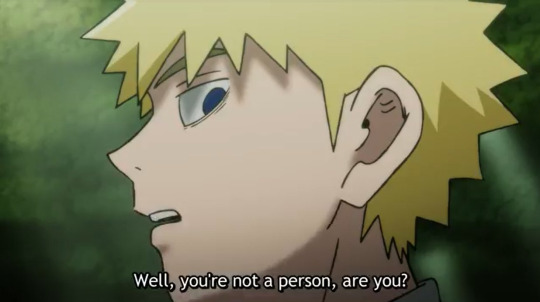
something about teru's continuous struggle to be humble. something about mob's teaching was the reason why he wanted to temper his ego. something about him facing off something that calls itself god, and also with the likeness of mob ohhh this is so fucked up

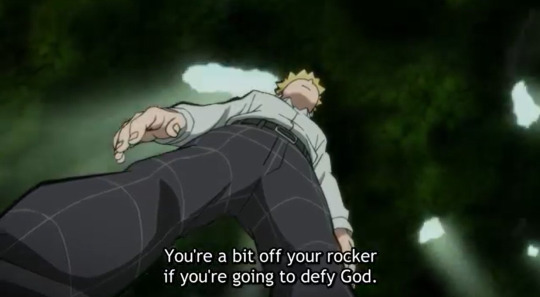
"I am god" and he looks like the one person teru genuinely looks up to. his fight against the brainwashing is him refusing to bow down to anyone. god and faith and pedestals and prayer and reverence. guys. GUYS
#teruki hanazawa#mp100#mob psycho 100#linktoo rambles#'I've had enough of you fools trying to control people through power'#'that won't help make you God... nor will it make you a star' he's talking about HIMSELF#and him saying strong emotions will help him fight brainwashing and then.... and then the words he heard from mob long ago wake him up SOB#I love you teru
3K notes
·
View notes
Text
"why not join me instead?" akechi's "invitation" in conf 7
People come and go on whether this question of Akechi's is genuine or not. Opinions run the gamut from "I hate him for trying to take you away from your friends" to "Akechi wants Joker to be his accomplice".
Myself, I don't think Akechi means this as a serious question, for a number of reasons. I think this question is rhetorical.
Quick summary:
Conf 7 illustrates the similarity between Joker and Akechi, and that they're both committed to the showdown between them;
Rather than being an invitation, Akechi's question again illustrates that parallel—that neither of them will give up the things that matter to them to join the other, as Joker has asked him to do;
"I'll think about it" does not count towards the third awakening—and I can prove it. Rather, Akechi can't conceive that Joker would ever abandon his friends, and uses it as an outrageous example of something Joker would never do;
Joker's loyalty not only to his principles but to his friends is something Akechi values so much that he won't let Joker sacrifice it;
Akechi is not so much offering Joker a way out in conf 7 (there is no way out) as he's confirming for his own sake that Joker is still in the game. Is this still a battle between rivals, or is it an execution?
Let's take a look.
what is akechi really asking?
[long post is long]
Look at this line. Look at the question he's posing:
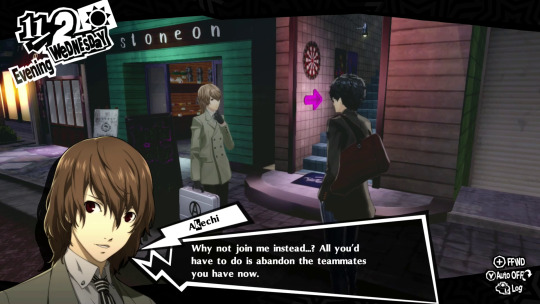
Akechi
いっそ君がこっちに来るってのは?⋯今の仲間を捨ててさ。
isso kimi ga kocchi ni kuru tte no wa?... ima no nakama o sutete sa
Why not join me instead...? All you'd have to do is abandon the teammates you have now.
It's very easy to focus on the first half of this question and miss the second. But that second half is the important part, the sting in the tail. The Japanese is a great example of wa building suspense: "Instead, what if you come over to my side, (AND THEN WHAT, AKECHI???????)"
The sentence is left hanging, with the weight of it unspoken (since wa emphasises what comes after it); Akechi is obviously not done speaking. And indeed, when he continues, it's a doozy:
"though, of course, you'd have to dump the friends you have now." (Yes, I think "friends" is often a much better translation of nakama than "teammates", fight me; it's even often translated as "friend" in P5 itself, or indeed, awkwardly, as "teammates and friends".)
Akechi is using the same verb, suteru, that you use for tossing something in the trash; the parallel meaning, "ending a relationship", exists in Japanese too.
Ryuji, Morgana, Ann, Yusuke, Makoto, Futaba, Haru, everything you've all gone through together and everything you've been—Akechi is suggesting you toss them aside like garbage. For him.
Now, I think part of Akechi would very much like Joker to do that. But he also knows better than to expect it. Because he knows Joker so much better than that.
Akechi has seen firsthand how loyal Joker is to his friends—remember on 1/2 how he says he investigated them all? He's seen some of the things Joker will do for them. He expects that blind faith to lead Joker to his death, much as Yaldabaoth does. But he also respects it.
This boy who's never had a friend, who's convinced himself the whole idea is stupid, is still drawn to the loyalty he sees in Joker. Even as he's preparing his own ultimate betrayal, Akechi recognises Joker's commitment to others. He understands treachery is bad, even though he himself is a traitor—just as he understands that murder is bad, and that doesn't stop him, either.
This question of whether or not Joker will betray his friends (and Akechi specifically) comes back on 2/2, of course—and in force.
so why does he ask
Akechi is not proposing that the two of them run off together. He's not asking to see what Joker will say. He doesn't impulsively make the invitation, and then run away when Joker says yes. He is, in fact, not even asking. He poses the idea of Joker abandoning all his friends as a counterexample. It's supposed to be something Joker would never consider, something he will find morally repugnant.
Which is why, if Joker says yes, Akechi is shocked, and essentially tells Joker not to make such stupid spur-of-the-moment decisions. Akechi is making a rhetorical point about what Joker is asking of him.
Remember Joker's statement that leads into Akechi's question:

Yeah. Joker either suggests that Akechi should give up everything he's doing and everything he believes in (even as Akechi confabulates about what those things really are), or he suggests, with the top option, that he's already done it.
And in return, Akechi says that Joker should join him... and throw away his friends and everything he's working for and everything he believes in, of course.
It's the second response to his question, where Joker turns him down flat, that makes it most obvious that this was what Akechi meant:
Joker
それは無理だ
sore wa muri da
I'm not doing that.
No way in hell.
Akechi
だろうね。
darou ne
I thought as much.
Akechi
分かるだろ、誰だって今の立場を簡単に捨てられやしないんだよ
wakaru daro, dare datte ima no tachiba o kantan ni suterare yashinai n da yo
I'm sure you understand. We all have our parts to play, and we can't simply leave those behind.
See what he's saying? ima no tachiba o kantan ni suterare yashinai—"we absolutely must not lightly set aside the positions we hold now".
Incidentally, yes, that's that same verb suteru that he used before, for casting aside or throwing away. Akechi is drawing a parallel between Joker's friends and his own goals—between the things each of them holds most dear, which neither of them will sacrifice, even to save the other. (Assuming you think Akechi would even be down to save Joker—but I do think conf 7 suggests that at this point, he might not be opposed to the possibility. It's just that it doesn't exist.)
the phone call
This parallel returns in the phone call afterwards, if you again tell him that you're rivals:
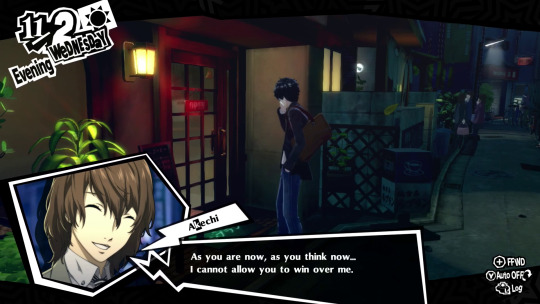
It's a little hard to tell from the localisation what Akechi is getting at, so let's take a close look:
Akechi
僕らにはお互い譲れないものがあって、そのためにも負けられない。
bokura ni wa otagai yuzurenai mono ga atte, sono tame ni mo makerarenai
[lit. for both of us, these are things we cannot compromise on, and because of those things we cannot suffer losing.]
Neither of us can afford to lose, because we fight in service of our principles.
It's the same for both of us. Neither of us can afford to lose, because of these principles we won't concede.
Akechi
⋯だからこそ、もしも君が自分を曲げたりしたら絶対に赦さないよ。
... dakara koso, moshi mo kimi ga jibun o megetari shitara zettai ni yurusanai yo
[lit. that's exactly why, if you were to warp yourself [that way], I would absolutely never let such a sin (t/n: note the kanji) pass.]
And that is precisely why... I cannot allow you to change.
... And that's precisely why, if you betrayed yourself that way... I couldn't allow it.
Akechi
だって、僕が負けたくないのは『君』なんだから。
datte, boku ga maketakunai no wa "kimi" nan da kara
[lit. it's you as you are now who I do not want to lose to.]
As you are now, as you think now... I cannot allow you to win over me.
The person you are now, with those principles, and that determination—that's the one I won't ever allow to beat me.
Here's my attempt at a translation again, so you can see it all together:
Akechi: It's the same for both of us. Neither of us can afford to lose, because of these things we won't concede.
Akechi: ...And that's precisely why, if you betrayed yourself that way... I couldn't allow it.
Akechi: The person you are now, with those principles, and that determination—that's the one I won't ever allow to beat me.
It turns out that this phone conversation, that was originally quite mystical-sounding and hard to follow (what were you trying to say, Akechi?) is quite straightforward. It ties into to his original question. "Will I join you, Joker? Well, what if you join me instead? Just throw away all your little friends for my sake? Of course you won't—because we're the same. Both of us have things we can't give up, no matter what—and if you tried to do that, I wouldn't let you, because I value you as you are...."
This parallel between the two of them is what conf 7 is about, from the text message that opens it to the phone call that concludes it:
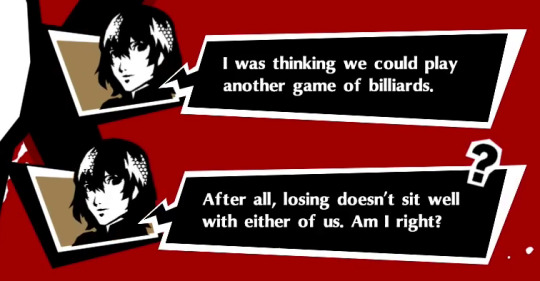
It's the same thing again: neither of you can afford to lose, because you're fighting for your principles. The billiard table is the stage for this wider discussion.
The billiard scene, of course, is interesting for another reason—Akechi is giving Joker a chance to back out; he's testing his commitment, and perhaps hinting that he never intended to be quite where he is, either. He states at the outset that he's being indirect, that what he's saying is a metaphor—and then closes that metaphor with a very direct question: "Do you still intend to play this game?"
Akechi
それでも君は、このゲームを降りる気はないの?
sore demo kimi wa, kono geemu o oriru ki wa nai no?
Even then... do you still intend to play this game?
But despite all of that, you still won't fold, will you?
The Japanese is even more specific: Akechi asks Joker if he intends to fold—not whether he still wants to play, but whether he means to give up entirely! "This can't be what you expected, so how about it? Will you just give up? Does this mean as much to you as it does to me? Is this a game we both choose to play, or are you just a victim?"
How much of this is Akechi blowing smoke up his own ass?—casting the fact that he's about to murder the boy in front of him in a glowing, romantic light? Pretty much all of it, I'd say. He's dreamed of having a rival, someone to compete with who challenges him, but what he's got is quite a bit more than that.
Again, the rival imagery is what allows Akechi not only to accept this close relationship, but to frame it as a life-or-death contest that only one of them can win. It confirms to him that what Lavenza describes as "a truly unfair game" is actually fair. It's about making Joker's murder seem as much Joker's fault as his own.
but what happens if you say yes?
Despite all of this, you can choose to have Joker consider Akechi's "offer"—to discard Ryuji, Morgana, Ann, Yusuke, Makoto, Futaba and Haru like trash, and assist Akechi instead. It's tempting, I know.
I don't personally get the impression that Akechi likes this response, for a number of reasons. None of the three responses to his offer score confidant points, but there's something else in play: only one of these responses unlocks his third awakening.

See the F code highlighted in yellow? Only one of these three responses has it. "You're my rival" counts towards the third awakening. Rejecting him, with "I'm not doing that", does not—but more to the point, offering to be with him, with "I'll think about it", also does not!
The issue is confused because a number of us have taken option 1 (or indeed option 2, like me) and still got the third awakening on 2/2. It seems like you need some of the flagged responses, not all of them. But it remains the case that "I'll think about it" does not make Akechi more likely to have his third awakening.
What happens if you take this option?
Joker
考えておく
kangaete oku
I'll think about it.
Akechi
へえ、考えてはくれるんだ?
hee, kangaete wa kureru n da?
Oh? So you'll think about it, at least?
What? You mean you'll consider it?
Akechi
⋯でも、そういうその場限りの情はやめた方がいい。
...demo, sou iu sono ba kagiri no jou wa yameta hou ga ii
...But I'd advise you don't say these things without their due consideration.
... Still, it would be better if you didn't trust such fleeting sentiments.
Akechi
出来もしない約束はするものじゃないよ。
deki mo shinai yakusoku wa suru mono ja nai yo
You shouldn't make promises that you can't keep, anyway.
Don't be the sort who promises the earth and walks away.
A few grammar points:
んだ n da on a question demands an explanation; Akechi's question could almost be rendered "Why on earth would you need/want to think about it?"
そういうその場限りの情 sou iu sono ba kagiri no jou—"sentiments that only matter here and now". Essentially, "sentiments that won't last"—or that are makeshift or ad hoc; Joker is making a stupid spur-of-the-moment decision.
yes, 出来もしない約束 deki mo shinai yakusoku translates idiomatically as "promising the earth". The point is not that Joker should not promise; the point is that he shouldn't be the sort of person who promises so much—and then doesn't follow through.
Again, this confidant is all about Akechi's expectations for Joker. It's about the weird belief he has in him, like the belief he has in Shido—that Joker has principles and friends and will stand by them, that those things are important and matter, even if they're diametrically opposed to Akechi's principles and the things he wants.
The fact that they foil each other in this way is a large part of what makes Joker such a worthy opponent for Akechi. So if Joker turns around and says, sure, Akechi, I'll dump all my friends so we can make out?
Akechi does not like that. He thinks better of him!—he loses respect if Joker offers this. Even if that little line about "promising the earth" suggests that, actually, yeah, he would quite like for the two of them to run away together—if only they lived in a world where it was possible.
what about "you're my rival"?
I've discussed this line before, but let's go into it for completeness.
Joker
明智は好敵手だ
akechi wa koutekishu da
You're my rival.
Nah, you're my worthy opponent.
Do you see that Joker names Akechi there? He doesn't just say, "we're worthy opponents", or even "you're my worthy opponent", koutekishu da yo.
No, he picks Akechi out by name, and then tells him exactly what they are to each other. Because wa builds suspense. Akechi wa... (what?! what is he?!) koutekishu da. "I can't run away with you, because I need you to be this to me instead".
And this is the line with the F-code. This is the line that, if you choose it, will build towards Akechi's third awakening—which is centred on his trust in Joker, on the fact that Joker is worthy of that trust.
And how does Akechi respond?

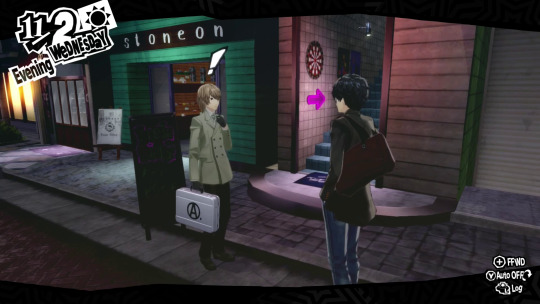
He's astonished. He did not expect this at all, look:
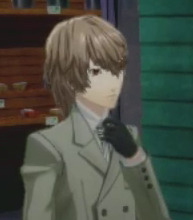
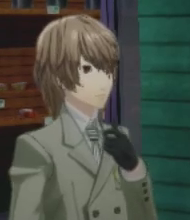

On the left, the top screenshot where he's waiting for your answer; in the centre, the moment of shock, where he's pulled away and dropped his hand and his eyes are wide; on the right, a comparative overlay just to demonstrate that he pulled back.
smiles that aren't smiles
I have a half-assed theory that you can tell when Akechi is really smiling—because the model will smile with him. If you watch, for instance, Ryuji, the model's expressions match the sprite's almost exactly. But if you watch Akechi? Nah, not so much.
Here's an example. Akechi appears to smile quite often through conf 7—but if you glance away from the sprite and textbox to the model, the model is pokerfaced. Five smile sprites on the optimal route through conf 7, and not one of them—not even "you truly are fascinating"—matches the model:
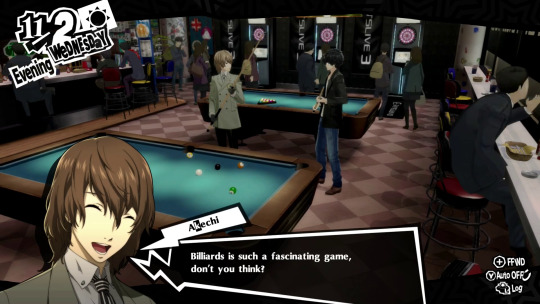
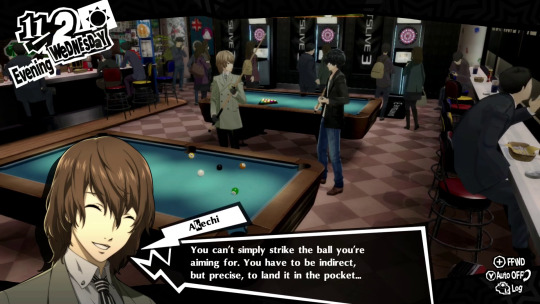
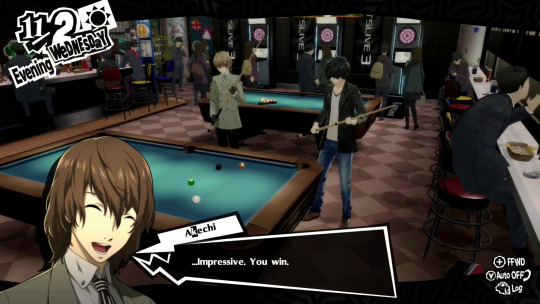
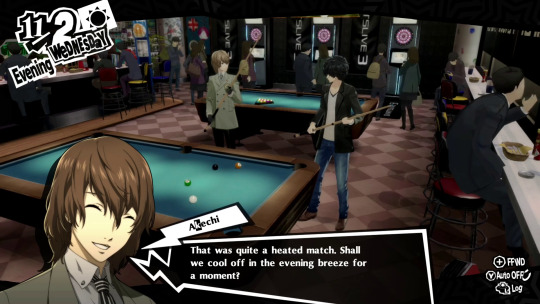
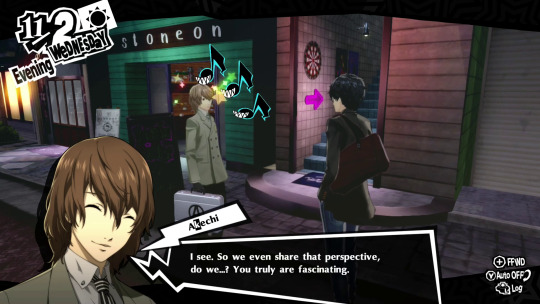
But when you pick "You're my rival"? Suddenly the model's face springs to life:


It's obvious from everything else that this moment is of deep significance to Akechi. But this little detail with the smiles suggests we can confirm it.
and what does he say?
It doesn't take long for him to pull himself together:
Akechi
同意だね、僕らにはなれ合いより対等な関係こそふさわしい。
doui da ne, bokura ni wa nareai yori taitouna kankei koso fusawashii
I agree. I think a relationship of equals suits us better than being co-conspirators, anyway...
This is another one that I find unclear in the localisation, so let's have at it.
nareai suggests an illicit or unduly-close union. It suggests "being in bed together" in the business sense—cosying up, colluding, conspiring. It suggests they're working together when they shouldn't be. Jisho uses the screamingly-outdated term "common-law marriage" (what we call "living together") as an example. Essentially, it suggests they're too close—or even co-dependent, in a way that corrupts them both.
In short? Akechi's "co-conspirators", nareai, means "accomplices"—what we might call "murder boyfriends".
taitouna kankei—literally, "an equal relationship"—is a set phrase, and we know what it means. It suggests a relationship where nobody is being cheated; where everyone gets out what they put in. Where the two of them compete on equal terms.
That's a very Akechi way to look at relationships. But it's also a relationship where nobody is in charge; nobody is dominant, and everyone has self-respect. Nobody is chasing after anyone or sacrificing unduly, as either would be if they joined the other. Everyone can be who they are and say what they want. Everyone can say no.
It's the sort of relationship Akechi very notably does not have with Shido. Is it the sort of relationship he has with Joker, when the two of them are hiding so much from each other and lying so much, and there's so much, like, murder going on? Nah. But as an aspiration, as a suggestion of the sort of relationship Akechi would like them to have, alongside everything else he's told us about how he sees the two of them—as similar, as equals and opposites, as bound by their principles, as destined to fight—it's almost touching.
and what does joker think?
Akechi
⋯たとえこの先、何があろうともだ。
...tatoe kono saki, nani ga arou tomo da
...No matter what else may change.
...No matter what might come next.
Akechi
それだけの事を言ったんだから、逃げないでよ?
sore dake no koto o itta n da kara, nigenaide yo?
In any case, what you just said carries great weight. Remember what you decided, and don't run from it. All right?
[lit. don't run away just because of what [I/you] said, all right?]
I'm not sure about this. It feels like it should be referring back to Akechi's last line—"don't get cold feet and run away just because I alluded ominously to whatever's coming next, okay?". I guess it could be referring to Joker's commitment, with "You're my rival"? IDK, I'm out on this one, so I'm inclined to give the localisation the benefit of the doubt.
But it doesn't matter. Because the significance of what Joker does next doesn't change:
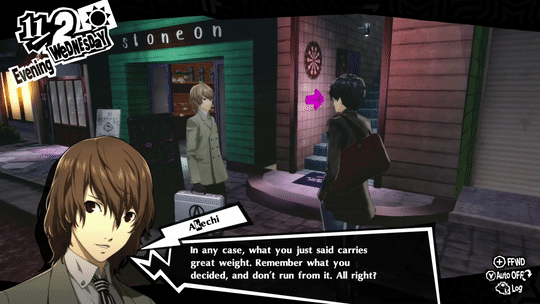
He nods. Akechi spends the whole confidant hinting that something ominous is coming, and that the two of them are heading to an inevitable confrontation, and Joker nods.
I don't think this is really consistent with interpretations where Joker is a meek little sheep in the interrogation room. Joker might not have chosen this, he might not have wanted it, he might have by far preferred to avoid it. He'd happily back out if Akechi would just drop the whole thing and agree to act sane. But he's committed to it. He agrees to fight.
Remember, conf 7 takes place after Joker hears the murder phone call. He knows what Akechi is. He knows what he's planning. He knows the stakes—and he agrees to play, to face Akechi down.
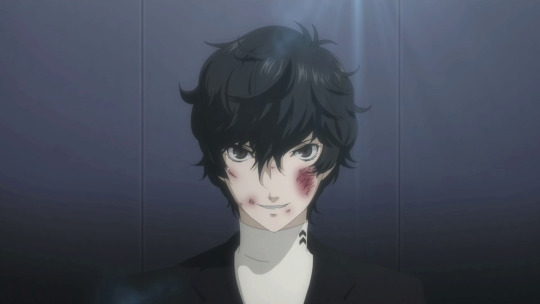
To quote @nardaviel, that's no sheep. That's a full-on "Phantom Thieves win again, motherfucker" smirk. Joker played Akechi's game, with everything he had—and he played to win.
#persona 5#p5 meta#japanese language#shuake#goro akechi#ren amamiya#almost the worst part of this is that akechi respecting joker for his loyalty tells you how little he respects himself#also! 'i'll think about it' CANNOT POSSIBLY unlock the third awakening#because the third awakening is *all about trust* and saying yes to akechi proves that you're a traitor#and that 'i won't forgive you if you betray your principles' on the phone? also 2/2. this is exactly what he does if you take the deal#also!! joker makes a third option to akechi's question with 'you're my rival' and this is what astonishes him besides the thing itself#also! (per leonawriter) the maruki deal ending is essentially the nareai relationship#where akira has all the power and akechi..? well#nobody is themself or choosing for themself#also as regards whether akechi is lying he proves himself through action#'i won't let you betray yourself' - he did that already if you tried to take the deal#ALSO? that 'megeru' for 'i won't let you depart from your principles comes back on 2/2#as joker's 'i won't fold'#and ofc it's ALSO akechi's 'you'd fold over...' that precedes that. it was set up in conf 7 if you took the rival route#so tldr it's plausible that 2/2 is as much akechi fighting for his vision of joker as for his right to die. help???#ALSO. did you wonder why it's *awakening* akechi who comes to leblanc? the one closer to you who believes in you more?#this is exactly why. awakening akechi has faith left in you to lose. non-awakening akechi already lost that faith. BYE
568 notes
·
View notes
Text
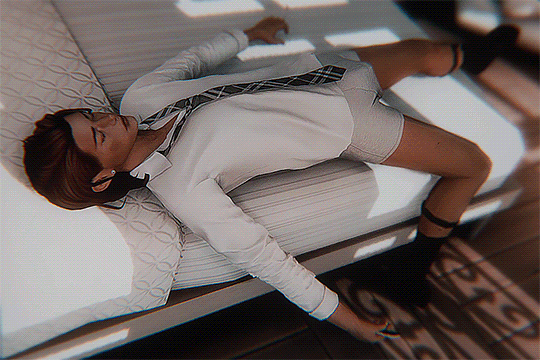
he's waiting on a call he's planning to send straight to voicemail
#sorry matthias </3 maybe he'll pick up the next time you try calling............ <- me when i lie#river dipping#ts4#ts4 edit#gifs#theodore doe#echthroi#hi friends and lovers hope everyone's doing well <3#i got my old laptop to work so i have a laptop again even if the battery on it is messed up#but still#i haven't been online much bc i've started getting dizzy from staring at computer/phone screens for too long#and in particular the act of scrolling either on mobile or desktop makes my head spin and my eyes hurt :/#but i powered through it yesterday so i could get in game with theo (and matthias) since i missed him really bad... oc plague be upon ye#i took... well. like five hundred screenshots and forty videos... i was in the soup. the mattodore soup. what can i say?#i don't like posting too much on here bc. i'm crazy (<- has avpd) so i probably won't post much from yesterday's fun here#but i'll post whatever i want on pillowfort <3 pic of jerma holding out his hand captioned let's take mattodore together#what else should i say before leaving... right my inbox... well i'll get to it eventually <- have been saying this since october sorry#but okay i've been staring at my screen too long so i need to go lay down for a bit#enjoy theo in motion!! if you’re a theo-head like myself#theodite à la jermamite? hm. its in the works. i’m workshopping.#mentioning jerma twice in these tags… busting a cyanide pill onto my tongue i’ve said too much#i have to go now mwah mwah mwah bye warmth and love to you mwah
250 notes
·
View notes
Note
Feel free to ignore you've probably got a lot going on right now, but considering you know a lot about DOTC and Clear sky, I had a question...
We know that he's a terrible, misogynistic, woman beating and war mongering lunatic who was excused of all his actions because his equally misogynistic brother said " But-But he's nice! Deep down! This isn't the real him! "
But! In a world where the Hunters could write such a character, what do you think Clear Sky would look like as an actual sympathetic villain?
Idk if that makes sense, but what I've thought of doing is taking purely cannon Clear Sky and attempting to change him enough that he's still an antagonist, but not too far where only Reddit defends him.
I don't think he works as a sympathetic villain, on any level, ever. I think you're making a huge mistake to even try, and I have never seen an AU where it was done well nor am I interested in entertaining the thought.
Characters. Are. Tools. They exist to tell a story. The story that people tell me, by obsessing over some alternate universe where he was "ACTUALLY sympathetic and had a REAL redemption arc," is that they're not fucking interested in his dozens of victims. Nor do they actually care about the abusive impact he had on the minds and feelings of his family. They're JUST interested in Clear Sky himself.
Just like the Erins. Everything that happens in DOTC revolves around him. Everything. All his wives die so he can be sad about it. His brother defends all of his actions and BEGS you to sympathize with his pain so he can be 'redeemable.' One Eye comes out of nowhere so that there can be an example of "real" evil to contrast Clear Sky so he's less bad in hindsight.
The first three books of DOTC are bad, but the last three are fucking insufferable because SUDDENLY all that Gray Wing apologia pays off, and they take their main villain and throw him out a window. You CAN'T have "redeemable" Clear Sky and the plot of DOTC without dragging in someone else to drive the conflict, to BE the bigger threat to "unite" against. Slash and One Eye have to be conjured up out of thin air so Clear Sky can WHINE about how people only suck his toes instead of deepthroat them after he killed all their friends.
And yet, in spite of this absolute failure of an attempt, we continue to see this bullshit "redemption" be a mistake because Clear Sky is a fantastic villain, with major antagonist roles in nearly EVERY bit of follow-up material for DOTC that came after.
He's the most consistent monster in all of Warriors.
He's a fragile, egotistical, self-absorbed megalomaniac who ALWAYS sees himself as the victim, REFUSING to self-reflect and blaming everything else for all of his terrible choices. He will USE your love of him against you like it's a chain through your nose, step out of line and he will yank you into place with guilt trips, manipulation, public shaming, and violence.
He's a child abuser. He's a tyrant. He abandons the sick and disabled as soon as they're of no use to him, with grand speeches about "illness" and "weakness." He's a murderer who stands above the shredded corpse of his victim and bellows, "I'M NOT GREEDY! I'M JUST STRONG!"
And you'd write a "good" redemption arc for this, why?
Why are people so chronically unable to accept that there are LOTS of people like him, and you can't save your abuser? Why don't you ask yourselves why you're not interested in exploring Thunder, or Petal, or Gray Wing, and how his toxic influence impacts them? Why does the sympathy fall on Clear Sky? What about the DOZENS of victims who are dead by Book 3, and how THEY could have been saved?
Why ruin a perfectly good villain?
What's behind this trend where a billion people say to me, "Yes Clear Sky is a walking cavalcade of fucked up abuse apologia, and an incredibly realistic depiction of an abuser, but how would you change this while keeping it all the same?"
I wouldn't. You can't. It wouldn't be the same story, or it wouldn't be the same character. Never seen it done well, and I have seen it a lot. So I don't entertain this deeply frustrating "Well What If Clear Sky But Nice" impulse.
#The closest I'll ever get to that is Fallenleaf. And she lost it all#And spent years in the time-out tunnel#BAD KITTIES GO IN THE PEAR WIGGLER TO BE SUFFICIENTLY WIGGLED.#I don't think people in power typically change. If they do it's so rare it's not worth entertaining. Camel through the eye of a needle shit#and I mean ALL powers. this goes for abusive relationships too. I think they need to lose that power before they change.#When you have power. REAL power. You can fill those holes with it. You can force people to not leave.#so im actively hostile to stories that winge and cry about giving powerful people endless sympathy and chances#You've already shown me what you want to do with your power and as long as you keep it you haven't seen your consequences.#Power reveals.#It doesn't corrupt. It reveals.#DOTC hate#clear sky's redemption arc#If you're in an abusive relationship or under a terrible boss or in some other bad environment. You won't fix it.#You are not responsible for fixing it.#You can't fix it.#And they will not change. so GET OUTTA THERE#And that's who he functions best as. To me.#He's the bastard you need to escape.#And that's infinitely more compelling to me than Nice Clear Sky Attempt 32324#I don't write stories that beg you to sympathize with tyrants and keep your heart open to some maybe-change on the horizon#I write stories where they ruin everything they touch and have to be forcefully yanked out of power before they hurt more people.#And also screw every related take that's like 'ohhh after 5000 years of having his toes sucked he regrets it a bit :('#no he fucking wouldn't. he had his toes sucked for 5000 years. He's vindicated by how fondly he's remembered.#You can't fucking tell me that he doesnt REVEL in how violent the culture became. That him being offended about the clan's exile-#--was anything but him being offended his namesake was going away. That he wouldn't parade around like every choice he ever made was right.#''I made some vague mistakes which I will never name. BUT Im never wrong and always did it my way even if it was hard''#If you haven't met a person like that I envy you.#bone babble#Nothing makes me mad quite like this character#Again I yell about his brother a lot because he's widely loved by the fandom
117 notes
·
View notes
Photo
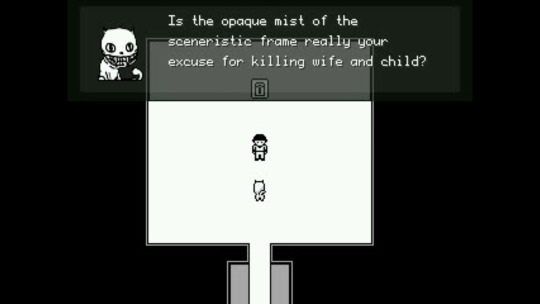
Okay, so like, I love Undertale to bits, but it does often rub me the wrong way when people use it in comparison to games like OFF, which condemn the Player’s violent actions without actually offering the option for a Pacifist resolution, like “well, Undertale is Objectively Better because there’s an actual choice to be nonviolent so it can actually condemn the player in a meaningful way”.
Especially with OFF, I think. Cause while many people consider it a predecessor to Undertale, their themes and the way they relate to their “What the Hell, Player” moments are very different, I think. And this attitude of judging them purely on whatever they’re effective at making the player ‘feel bad’ about their actions is really reductive for what both games are trying to do with these kinda moments.
Like, in general it’s super frustrating when video game moments discussing morality and player-player character relationships are evaluated purely in the sense of ‘are these games justified in Making Me Feel Like a Bad Person’. That’s usually a super-reductive way to look at video game morality. And I really don’t think it helps the discussion to frame “What the Hell Player” moments as an actual personal attack or attempt to evaluate your IRL morality.
And specifically with OFF, I feel like it’s actually very thematically important that the game only has one ‘Route’ and that it is the ‘bad’ one. Because OFF, in my reading at least, is a game very much about narrative framing. Like, that’s the whole thing with the Batter not actually transforming as his Special Ending Monster Duckie Form.
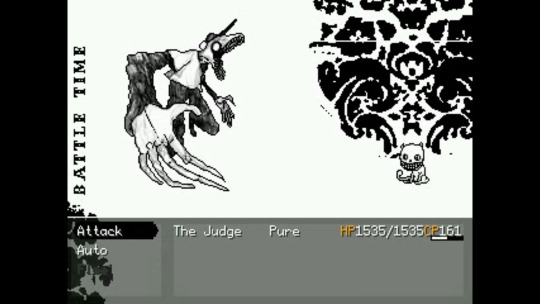
The Batter didn’t change, our point of view did. When we’re controlling the Batter, it is his POV that we’re seeing the world through - and in his POV he’s just an ordinary guy doing the right thing. But if we take the Judge’s side, we’re also taking on his POV. And the Judge, much like any other victim of the Batter, sees him as some sort of monster.
And that’s like a huge theme in the game. While there’s probably no POV that makes the world of OFF like an actually good place to live, it is important to note we are viewing it through the perspective of someone who has already vowed to destroy it. I know a lot of people look at the difference between the Guardians as they are in the Room’s Chapter 4 and the Guardians as the Batter face them as a matter of a personal change between then and now - I think the matter of different perspectives also plays a part.
In the Room we are viewing Dedan, Japhet and Enoch through the eyes of an innocent child that is desperate for companionship and sees them as friends - in the rest of the game we are viewing them through the eyes of a man who sees them as obstacles in his holy mission and upholders of a world that must be destroyed. Neither of them can give a truly unbiased perspective when it comes to the Guardians.
And despite the game making it explicit that the Batter is as a puppet controlled by the Player - although the Player is the one who give the Player Character power - it is the Batter who manipulates the Player into aiding him on his mission by framing it in a way that is more palatable. Despite all the power the player supposedly holds, the Batter holds the power over the narrative framing, and that’s enough to let him take control.
That’s why there’s really no choice in the game but keep helping the Batter along his ‘Holy’ mission - him being able to influence our framing also means being able to influence the options we can see. It is the Batter who wants us to see a world where his violence and destruction is the only possible solution. And the point of the Judge calling out the Player for continuing along the Batter’s set path (rather than stopping the game and turning it off) isn’t just to Make the Player Feel Bad for doing what they need to do to, like, see the whole of this well-crafted story....
It’s to make the Player self-reflect. When did they first had the inkling that the Batter isn’t on the up-and-up? If (‘if’ bring the keyword here) it was all real, when would the point where continuing to aid the Batter would be morally inexcusable? By the point the Batter is beating a defenseless child to death it’s pretty darn clear that We’re the Baddies, but did the Player process any of the hints beforehand? Just how much sway did the Batter’s framing of the world and the narrative hold over the player? And how this is different and similar to how the Player normally engage with other narratives, especially other RPGs?
There is a reason, after all, why the Judge big speech at the end is also about how felt deceived and tricked by the Batter’s words. His feelings are meant to be a reflection of a Player’s on some level.

And despite ‘calling-out’ the Player, he does make it clear he also sees himself as culpable of aiding the Batter in his henious actions. The Player and the Judge’s situations are somewhat paralleled here.
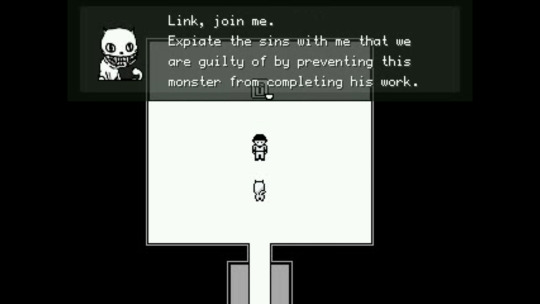

And it feels very notable that the Judge starts out explictly addressing to the Player much more than the ‘Puppet’:


And by the ending of the game, although he does call-out the Player to, he’s got a lot more to say to the Batter as well.

I think it’s because he also underestimated the power the Batter had as a ‘Puppet’ of the Player, up until he realized how he managed to manipulate both him and the Player (although he still sees both himself and the Player at fault for falling for it and helping the Batter).
I think the main point here is to try and make the Player think more critically about the narratives they engage with. In many ways, the Batter is the concept of the RPG protagonist dilluted to its logical extreme. He was literally brought into existence just moments before the story started, and his only purpose in life is to defeat all the bosses, ‘finish’ all of the areas and then just turn the game OFF. That’s also why siding with the Batter is considered the ‘canon’ ending of the game, in this allegory it is the ending that correspond most to Regular Player Behavior.

It’s trying to make you think about how different POVs and narrative framing can be used to change the way we view a story. If the Batter can skew the lens we view the story enough so that it makes us side with him… how other forms of media, and in this case espacially other games can convince us that the protagonist’s actions are justified and heroic? Is there some ignored angle in this and that game, some ignored ‘Judge’ of sort, that would totally reframe the supposed morality of the story?
I think that’s the main thing, or at least one of the main things, one is supposed to get from OFF. Not just a blanket sense of guilt for all the made-up pixels you killed in this game or other games, but an invitation to try and examine the stories you play from more angles, and think more of the narrative tricks that can be used to justify morally dubious actions. For this to work, the game has to work in tandem with the Batter and his POV for the most part. And because of all of this, I believe OFF’s lack of a ‘moral choice’ system does not take away from its central points and actually helps them. The only choice comes when the Judge barges in and offers a counter-narrative to the Batter.
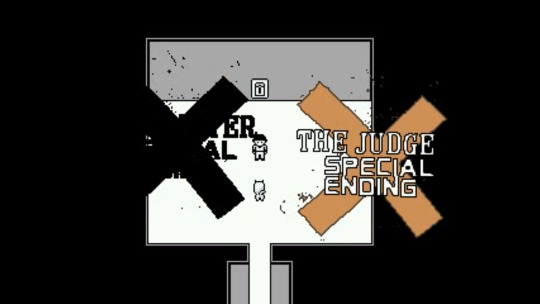
Undertale, in contrast, is a lot more about Player Actions and Player Agency. Like, Chara and a Murder-Route Player have essentially a reverse dynamic from the Batter and a Normal Ending Player. With the Player convincing the Player Character (?) into the viewpoint that the world exists just to be drained of Content before turning it Off and moving on to the next one.
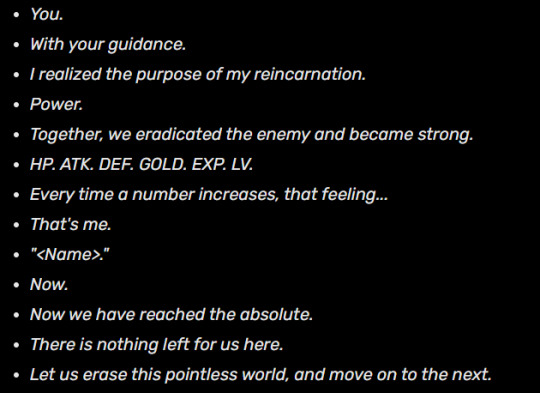
Undertale is more about the Player having power, and not just in the Unkillable Time God sense, in the sense of the power to reframe and change the narrative. Both the Undertale Pacifist and Murder Route has an element of going ‘off script’ of what the game story ‘expects’. Like, the Normal Ending is the only one where the the Player just does what was expected of them and engage with the game world in the same way all the other characters do - that’s just why it only exist to try and convince you to go on one of the other routes.
The Pacifist Route is about the Player using their Aforementioned Unkillable Time God Powers to break away from the world’s general resignation to violence as the answer and proving to everyone a peaceful resolution is possible. The Murder Route is about the Player engaging with the world like… an ordinary RPG basically (as long as you’re heavy on the grinding) and in the process twist the entire narrative into something much darker. The narrative isn’t tricking you into it, if anything, the narrative is subtly nudging you to the Pacifist Ending.
If Undertale comes off as a more effective ‘condemnation’ of the Player than OFF, that’s probably because compared to OFF Undertale is more about what the Player does and the Player’s actions. I still don’t think it’s a very productive to paint it as, like, trying to Shame you. It just makes things far too unnecessarily personal in a really weird way, and it also kinda isolates discussion of the game’s mortality to only how justified it is within the game’s own context - without any acknowledgement of what the game’s trying to say in a larger context when it makes the characters so darn lovable and makes it so heartbreaking when they die.
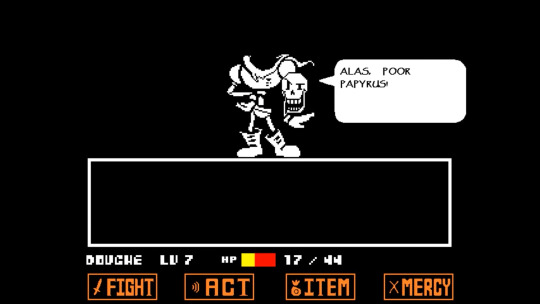
Both in context of how we can try and take the game’s ideals into the real world....

And how it relates to other video games. And I mean, Undertale isn’t just about whatever violence in video game narratives is really necessary - that’s absolutely part of it but also, it’s about how Players engage with video game narratives. And whatever looking at them as just challenges to be one by getting the Big Number....

or challenges you need to 100% complete and drain every single secret from

can take away from what makes a good story actually work.

There’s a reason why the in-universe ‘morally correct’ to play Undertale is to experience the True Pacifist ending once and never open it again. (I dunno if I’ll say the Message of Undertale is ‘looking up all kinds of different minor options and content mining always ruins the magic of stories’ and if it is it’ll be a very funny case of a game’s fandom disproving its own thesis, but it’s certainly something the game wants you consider.)
Despite the obvious influence OFF had on Undertale and especially on it’s Murder Route, I actually think it might be more useful to compare it to Deltarune, at least once we see more of it and where it’s going. With both of these games exploring a very complicated power dynamic between player and player character and the player being robbed of moral choice and possibly forced to do bad things to advance the narrative - it might be actually a more interesting comparison.
#Off#undertale#undertale meta#undertale analysis#off game#you see on one hand I can't say I enjoy the story of Undertale LESS just because the fandom complied this big ol' lists of Every Single#Event Trigger in the whole entire game or something#but on the other hand there is something very impactful about going through the Pacifist Route#and KNOWING you won't be able to justify to yourself doing a True Reset#so you just try your best to do everything that you can and really experience the game to it's fullest before you have to say Goodbye to#all of these characters basically forever#and espacially after just helped Asriel agree to let US go and move on#the fact the game also pleads for us to go and move on does enchance the emotional power of the ending on some level I think
231 notes
·
View notes
Text
Clad in Justice and Worth
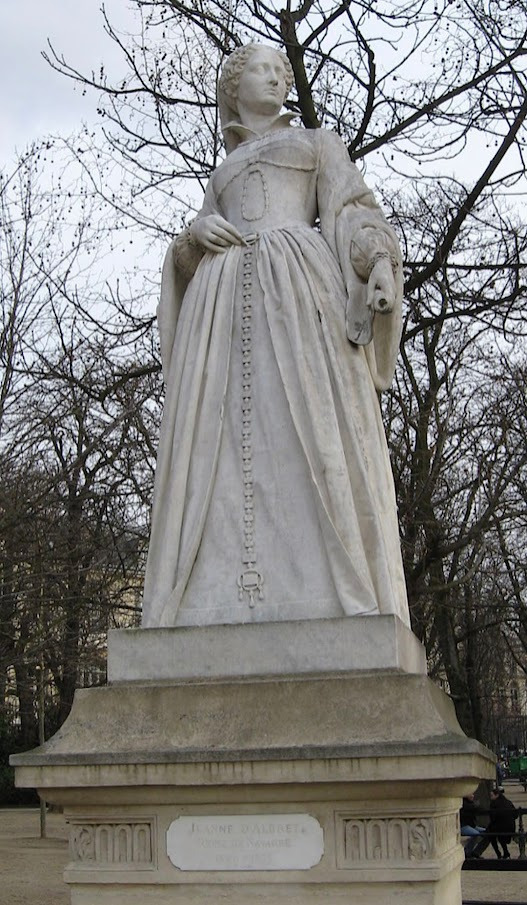
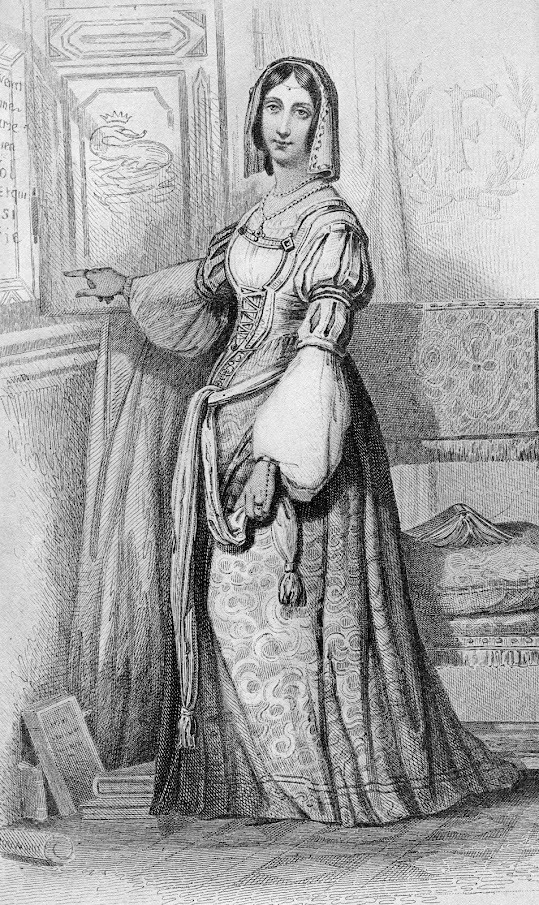
Written for the Inklings Challenge 2023 (@inklings-challenge). Inspired by the lives of Jeanne d'Albret and Marguerite de Navarre, although numerous liberties have been taken with the history in the name of introducing fantastical elements and telling a good story. The anglicization of names (Jeanne to Joan and Marguerite to Margaret) is meant to reflect the fictionalization of these figures.
The heat was unbearable, and it would grow only hotter as they descended into the lowlands. It was fortunate, Joan decided, that Navarre was a mountain country. It was temperate, even cold there in September. It would be sweltering by the sea.
The greater issue ought to have been the presence of Monluc, who would cut Joan’s party off at the Garonne River most like. The soldiers with whom she traveled were fierce, but Monluc had an entire division at the Garrone. Joan would be a prisoner of war if Providence did not see her through. Henry, perhaps, might suffer worse. He might be married to a Catholic princess.
Yet Joan was accustomed to peril. She had cut her teeth on it. Her first act as queen, some twenty years ago, had been to orchestrate the defense of her kingdom, and she was accustomed to slipping through nets and past assassins. The same could not be said of the infernal heat, which assaulted her without respite. Joan wore sensible travel clothing, but the layers of her skirts were always heavy with sweat. A perpetual tightness sat in her chest, the remnant of an old bout with consumption, and however much she coughed it would not leave.
All the same, it would not do to seem less than strong, so she hid the coughing whenever she could. The hovering of her aides was an irritant and she often wished she could just dismiss them all.
“How fare you in the heat, Majesty?”
“I have war in my gut, Clemont,” Joan snapped. “Worry not for me. If you must pester someone, pester Henry.”
He nodded, chastened. “A messenger is here from Navarre. Sent, I suspect, to induce you to return hence.”
“I would not listen to his birdcalls.”
“Young Henry said much the same.”
Joan stuffed down her irritation that Clemont had gone to Henry before he’d come to her. She was still queen, even if her son was rapidly nearing his majority. “Tell him that if the Huguenot leaders are to be plucked, I think it better that we all go together. Tell him that I would rather my son and I stand with our brothers than await soldiers and assassins in our little kingdom.”
Her aide gave a stiff nod. “At once, your Majesty.”
She would breathe easier when they reached the host at La Rochelle. Yet then, there would be more and greater work to do. There would be war, and Joan would be at the head of it.
*
When she awoke in the night, Joan knew at once that something was awry. It was cool. Gone was the blistering heat that had plagued them all day. Perhaps one of the kidnapping plots had finally succeeded.
Certainly, it seemed that way. She was in a cell, cool and dank and no more than six paces square. And yet—how strange! —the door was open.
Rising unsteadily to her feet, Joan crept towards the shaft of moonlight that fell through it. She glanced about for guards, but saw only a single prisoner in dirty clothes standing just beyond the threshold. He was blinking rapidly, as though the very existence of light bewildered him. Then, as Joan watched, he crept forward towards the gate of the jailhouse and out into the free air beyond. Joan listened for a long moment, trying to hear if there was any commotion at the prisoner’s emergence. When she could perceive none, she followed him out into the cool night air.
A lantern blazed. “Come quickly,” a voice hissed. “Our friend the Princess is waiting.”
The prisoner answered in a voice too quiet for Joan to hear. Then, quite suddenly, she heard his companion say, “Who is it that there behind you?”
The prisoner turned round, and Joan’s fingers itched towards her hidden knife. But much to her astonishment, he exclaimed, “Why, it is the lady herself! Margaret!”
But Joan had no opportunity to reply. Voices sounded outside her pavilion and she awoke to the oppressive heat of the day before. Coughing hard, Joan rolled ungracefully from her bed and tried to put away the grasping tendrils of her dream.
“The river is dry, Majesty” her attendant informed her as soon as she emerged from her pavilion, arrayed once again in sensible riding clothes. “The heat has devoured it. We can bypass Monluc without trouble, I deem.”
“Well then,” Joan replied, stifling another cough. “Glory to God for the heat.”
*
They did indeed pass Monluc the next day, within three fingers of his nose. Joan celebrated with Henry and the rest, yet all the while her mind was half taken up with her dream from the night before. Never, in all her life, had her mind conjured so vivid a sensory illusion. It had really felt cool in that jail cell, and the moonlight beyond it had been silver and true. Stranger still, the prisoner and his accomplice had called Joan by her mother’s name.
Joan had known her mother only a little. At the age of five, she had been detained at the French court while her mother returned to Navarre. This was largely on account of her mother’s religious convictions. Margaret of Angoulême had meddled too closely with Protestantism, so her brother the king had seen fit to deprive her of her daughter and raise her a Catholic princess.
His successor had likewise stolen Henry from Joan, for despite the king’s best efforts she was as Protestant as her mother. Yet unlike Margaret, Joan had gone back for her child. Two years ago, she had secretly swept Henry away from Paris on horseback. She’d galloped the horses nearly to death, but she’d gotten him to the armed force waiting at the border, and then at last home to Navarre. Sometimes, Joan wondered why her own mother had not gone to such lengths to rescue her. But Margaret’s best weapons had been tears, it was said, and tears could not do the work of sharp swords.
The Navarre party arrived at La Rochelle just before dusk on the twenty-eighth of September. The heat had faltered a little, to everyone’s great relief, but the air by the sea was still heavy with moisture. The tightness in Joan’s chest persisted.
“There will be much celebration now that you have come, Your Majesty,” said the boy seeing to her accommodations. “There’s talk of giving you the key to the city, and more besides.”
Sure enough, Joan was greeted with applause when she entered the Huguenot council. “I and my son are here to promote the success of our great cause or to share in its disaster,” she said when the council quieted. “I have been reproached for leaving my lands open to invasion by Spain, but I put my confidence in God who will not suffer a hair of our heads to perish. How could I stay while my fellow believers were being massacred? To let a man drown is to commit murder.”
*
Sometimes it seemed that the men only played at war. The Duke of Conde, who led the Huguenot forces, treated it as a game of chivalry between gentlemen. Others, like Monluc, regarded it as a business; the mercenaries he hired robbed and raped and brutalized, and though be bemoaned the cruelty he did nothing to curtail it.
There were sixty-thousand refugees pouring into the city. Joan was not playing at war. When she rose in the mornings, she put poultices on her chest, then went to her office after breaking her fast. There was much to do. She administered the city, attended councils of war, and advised the synod. In addition, she was still queen of Navarre, and was required to govern her own kingdom from afar.
In the afternoons, she often met with Beza to discuss matters of the church, or else with Conde, to discuss military matters. Joan worked on the city’s fortifications, and in the evenings she would ride out to observe them. Henry often joined her on these rides; he was learning the art of war, and he seemed to have a knack for it.
“A knack is not sufficient,” Joan told him. “Anyone can learn to fortify a port. I have learned, and I am a woman.”
“I know it is not sufficient,” the boy replied. “I must commit myself entirely to the cause of our people, and of Our Lord. Is that not what you were going to tell me?”
“Ah, Henry, you know me too well. I am glad of it. I am glad to see you bear with strength the great and terrible charge which sits upon your shoulders.”
“How can I help being strong? I have you for a mother.”
At night, Joan fell into bed too exhausted for dreams.
*
Yet one night, she woke once again to find her chest loose and her breathing comfortable. She stood in a hallway which she recognized at once. She was at the Château de Fontainebleau, the place of her birth, just beyond the door to the king’s private chambers.
“Oh please, Francis, please. You cannot really mean to send him to the stake!” The voice on the other side of the door was female, and it did not belong to the queen.
A heavy sigh answered it. “I mean to do just that, ma mignonne. He is a damned heretic, and a rabble-rouser besides. Now, sister, don’t cry. If there’s one thing I cannot bear, it is your weeping.”
At those words, a surge of giddiness, like lightning, came over Joan’s whole body. It was her own mother speaking to the king. She was but a few steps away and they were separated only by a single wooden door.
“He is my friend, Francis. Do you say I should not weep for my friends?”
A loud harumph. “A strange thing, Margaret. Your own companions told me that you have never met the man.”
“Does such a triviality preclude friendship? He is my brother in Our Lord.”
“And I am your true brother, and your king besides.”
“And as you are my brother—” here, Margaret’s voice cracked with overburdening emotion. She was crying again, Joan was certain. “As you are my brother, you must grant me this boon. Do not harm those I love, Francis.”
The king did not respond, so Joan drew nearer to the door. A minute later, she leapt backwards when it opened. There stood her mother, not old and sick as Joan had last seen her twenty years before, but younger even than Joan herself.
“If you’ve time to stand about listening at doors, then you are not otherwise employed,” Margaret said, wiping her tears from her face with the back of her hand. “I am going to visit a friend. You shall accompany me.”
Looking down at herself, Joan realized that her mother must have mistaken her for one of Fountainbleu’s many ladies-in-waiting. She was in her night clothes, which was really a simple day dress such as a woman might wear to a provincial market. Joan did not sleep in anything which would hinder her from acting immediately, should the city be attacked in the middle of the night.
“As you wish, Majesty,” Joan replied with a curtsey. Margaret raised an eyebrow, and instantly Joan corrected herself: “Your Highness.”
Margaret stopped at her own rooms to wrap herself in a plain, hooded cloak. “What is your name?” she asked.
“Joan, your Highness.”
“Well, Joan. As penance for eavesdropping, you shall keep your own counsel with regards to our errand. Is that clear?”
“Yes, your Highness,” Joan replied stiffly. Any fool could see what friend Margaret intended to visit, and Joan wished she could think of a way to cut through the pretense.
When Margaret arrived at the jail with Joan in tow, the warden greeted her almost like a friend. “You are here to see the heretic, Princess? Shall I fetch you a chair?”
“Yes, Phillip. And a lantern, if you would.”
The cell was nearly identical to the one which Joan had dreamed on the road to La Rochelle. Inside sat a man with sparse gray hair covering his chin. Margaret’s chair was placed just outside the cell, but she brushed past it. She handed the lantern to Joan and knelt down in the cell beside the prisoner.
“I was told that I had a secret friend in the court,” he said. “I see now that she is an angel.”
“No angel, monsieur Faber. I am Margaret, and this is my lady, Joan. I have come to see to your welfare, as best I am able.”
Now, Margaret’s hood fell back, and all at once she looked every inch the Princess of France. Yet her voice was small and choked when she said, “Will you do me the honor of praying with me?”
Margaret was already on her knees, but she lowered herself further. She rested one hand lightly on Faber’s knee, and after a moment, he took it. Her eyes fluttered closed. In the dim light, Joan thought she saw tears starting down her mother’s cheek.
When she woke in the morning, Joan could still remember her mother’s face. There were tears in her hazelnut eyes, and a weeping quiver in her voice.
*
Winter came, and Joan’s coughing grew worse. There was blood in it now, and occasionally bits of feathery flesh that got caught in her throat and made her gag. She hid it in her handkerchief.
“Winter battles are ugly,” Conde remarked one morning as Christmas was drawing near. “If the enemy is anything like gentlemen, they will not attack until spring. And yet, I think, we must stand at readiness.”
“By all means,” Joan replied. “Anything less than readiness would be negligence.”
Conde chuckled, not unkindly. “For all your strength and skill, madame, it is obvious that you were not bred for command. No force can be always at readiness. It would kill the men as surely as the sword. ‘Tis not negligence to celebrate the birth of Our Lord, for instance.”
Joan nodded curtly, but did not reply.
As the new year began, the city was increasingly on edge. There was frequent unrest among the refugees, and the soldiers Joan met when she rode the fortifications nearly always remarked that an attack would come soon.
Then, as February melted into March, word came from Admiral Coligny that his position along the Guirlande Stream had been compromised. The Catholic vanguard was swift approaching, and more Huguenot forces were needed. By the time word reached Joan in the form of a breathless young page outside her office, Conde was already assembling the cavalry. Joan made for the Navarre quarter at once, as fast as her lungs and her skirts would let her.
The battle was an unmitigated disaster. The Huguenots arrived late, and in insufficient numbers. Their horses were scattered and their infantry routed, and the bulk of their force was forced back to Cognac to regroup. As wounded came pouring in, Joan went to the surgical tents to make herself useful.
The commander La Noue’s left arm had been shattered and required amputation. Steeling herself, Joan thought of Margaret’s tearstained cheeks as she knelt beside Faber. “Commander La Noue,” she murmured, “Would it comfort you if I held your other hand?”
“That it would, Your Majesty,” the commander replied. So, as the surgeon brandished his saw, Joan gripped the commander’s hand tight and began to pray. She let go only once, to cover her mouth as she hacked blood into her palm. It blended in easily with the carnage of the field hospital.
Yet it was not till after the battle was over that Joan learned the worst of it. “His Grace, General Conde is dead,” her captain told her in her tent that evening. “He was unseated in the battle. They took him captive, and then they shot him. Unarmed and under guard! Why, as I speak these words, they are parading his corpse through the streets of Jarnac.”
“So much for chivalry,” murmured Joan, trying to ignore the memories of Conde’s pleasant face chuckling, calling her skilled and strong.
“We will need to find another Prince of the Blood to champion our cause,” her captain continued. “Else the army will crumble. If there’s to be any hope for Protestantism in France, we had better produce one with haste. Admiral Coligny will not serve. He’s tried to rally the men, to no avail. In fact, he has bid me request that you make an attempt on the morn.”
“Henry will lead.”
“Henry? Why, he’s only a boy!”
Joan shook her head. “He is nearly a man, Captain, and he’s a keen knack for military matters. He trained with Conde himself, and he saw to the fortification of La Rochelle at my side. He is strong, which matters most of all. If it’s a Prince of the Blood the army requires, Henry will serve.”
“As you say, Majesty,” said her captain with a bow. “But it’s not me you will have to convince.”
*
Joan settled in for a sleepless night. Her captain was correct that she would need to persuade the Huguenot forces well, if they were to swear themselves to Henry. So, she would speak. Joan would rally their courage, and then she would present them with her son and see if they would follow him.
Page after page she wrote, none of it any good. Eloquence alone would not suffice; Joan’s words had to burn in men’s chests. She needed such words as she had never spoken before, and she needed them by morning.
By three o’clock, Joan’s pages were painted with blood. Her lungs were tearing themselves to shreds in her chest, and the proof was there on the paper beside all her insufficient words. She almost hated herself then. Now, when circumstance required of her greater strength than ever before, all Joan’s frame was weakness and frailty.
An hour later, she fell asleep.
When Joan’s eyes fluttered open, she knew at once where she was. Why, these were her own rooms at home in Navarre! Sunlight flooded through her own open windows and drew ladders of light across Joan’s very own floor. Her bed sat in the corner, curtains open. Her dressing room and closet were just there, and her own writing desk—
There was a figure at Joan’s writing desk. Margaret. She looked up.
“My Joan,” she said. It started as a sigh, but it turned into a sob by the end. “My very own Joan, all grown up. How tired you look.”
The words seemed larger than themselves somehow. They were Truth and Beauty in capital letters, illuminated red and gold. Something in Joan’s chest seized; something other than her lungs.
“How do you know me, mother?”
“How could I not? I have been parted from you of late, yet your face is more precious to me than all the kingdoms of the earth.”
“Oh.” And then, because she could not think of anything else to say, Joan asked, “What were you writing, before I came in?”’
“Poetry.” Joan made a noise in her throat. “You disapprove?” asked her mother.
“No, not at all. Would that I had time for such sweet pursuits. I have worn myself out this night writing a war speech. It cannot be poetry, mother. It must be wine. It must–” then, without preamble, Joan collapsed into a fit of coughing. At once, her mother was on her feet, handkerchief in hand. She pressed it to Joan’s mouth, all the while rubbing circles on her back as she coughed and gagged. When the handkerchief came away at last, it was stained red.
“What a courageous woman you are,” Margaret whispered into her hair. “Words like wine for the soldiers, and yourself spitting blood. Will you wear pearls or armor when you address them?”
“I will address them on horseback in the field,” answered Joan with a rasp. “I would have them see my strength.”
Her mother’s dark eyes flickered then. Margaret looked at her daughter, come miraculously home to her against the will of the king and the very flow of time itself. She was not a large woman, but she held herself well. She stood brave and tall, though no one had asked it of her.
Her own dear daughter did not have time for poetry. Margaret regretted that small fact so much that it came welling up in her eyes. “And what of your weakness, child? Will you let anyone see that?”
Joan reached out and caught her mother’s tears. Her fingertips were harder than Margaret’s were. They scratched across the sensitive skin below her eyes.
“Did I not meet you like this once before? You are the same Joan who came with me to the jail in Paris once. I did not know you then. I had not yet borne you.”
“Yes, the very same. We visited a Monsieur Faber, I believe. What became of that poor man?”
Margaret sighed. She crossed back over to the desk to fall back into her seat, and in a smaller voice she said, “My brother released him, for a time. And then, when I was next absent from Paris, he was arrested again and sent to the stake before I could return.”
“I saw you save another man, once. I do not know his name. How many prisoners did you save, mother?”
“Many. Not near enough. Not as many as those with whom I wept by lantern light.”
“Did the weeping do any good, I wonder.”
“Those who lived were saved by weeping. Those who died may have been comforted by it. It was the only thing I could give them, and so I must believe that Our Lord made good use of it.”
Joan shook her head. She almost wanted to cry too, then. The feeling surprised her. Joan detested crying.
“All those men freed from prison, yet you never came for me. Why?”
“Francis was determined. A choice between following Christ and keeping you near was no choice at all, though it broke my heart to make it.”
If Joan shut her eyes, she could still remember the terror of the night she had rescued Henry. “You could have come with soldiers. You could have stolen me away in the night.”
Margaret did not answer. The tears came faster now and her fair, queenly skin blossomed red. So many years would pass between the dear little girl she’d left in Paris and the stalwart woman now before her. She did not have time for poetry, but if Margaret had been allowed to keep her that would have been different. Joan should have had every poem under the sun.
“Will you read it?” she asked, taking the parchment from her desk and pressing it into her daughter’s hands. “Will you grant me that boon?”
Slowly, almost numbly, Joan nodded. To Margaret’s surprise, she read aloud.
“God has predestined His own
That they should be sons and heirs.
Drawn by gentle constraint
A zeal consuming is theirs.
They shall inherit the earth
Clad in justice and worth.”
“Clad in justice and worth,” she repeated, handing back the parchment. “It’s a good poem.”
“It isn’t finished,” replied her mother.
Joan laughed. “Neither is my speech. It must be almost morning now.”
As loving arms closed around her again, Joan wished to God that she could remain in Navarre with her mother. She knew that she and Margaret did not share a heart: her mother was tender like Joan could never be. Yet all the same, she wanted to believe that they had been forged by the same Christian hope and conviction. She wanted to believe that she, Joan, could free the prisoners too.
She shut her eyes against her mother’s shoulder. When she opened them, she was back in her tent, with morning sun streaming in.
*
She came before the army mounted on a horse with Henry beside her. Her words were like wine when she spoke.
“When I, the queen, hope still, is it for you to fear? Because Conde is dead, is all therefore lost? Does our cause cease to be just and holy? No; God, who has already rescued you from perils innumerable, has raised up brothers-in-arms to succeed Conde.
Soldiers, I offer you everything in my power to bestow–my dominions, my treasures, my life, and that which is dearer to me than all, my son. I make here a solemn oath before you all, and you know me too well to doubt my word: I swear to defend to my last sigh the holy cause which now unites us, which is that of honor and truth.”
When she finished speaking, Joan coughed red into her hands. There was quiet for a long moment, and then a loud hurrah! went up along the lines. Joan looked out at the soldiers, and from the front she saw her mother standing there, with tears in her eyes.
#inklingschallenge#inklings challenge#team tolkien#genre: time travel#theme: visiting the imprisoned#with a tiny little hint of#theme: visiting the sick#story: complete#so i like to read about the reformation in october when i can#when the teams were announced i was burning through a book on the women of the reformation and these two really reached out and grabbed me#Jeanne in particular. i was like 'it is so insane that this person is not more widely known.'#Protestantism has its very own badass Jeanne/Joan. as far as i'm concerned she should be as famous as Joan of Arc#so that was the basis for this story#somewhere along the line it evolved into a study on different kinds of feminine power#and also illness worked itself in there. go me#anyway. hopefully my catholic friends will give me a shot here in spite of the protestantism inherant in the premise#i didn't necessarily mean to go with something this strongly protestant as a result of the Catholic works of mercy themes#but i'm rather tickled that it worked out that way#on the other hand i know that i have people following me that know way more about the French Wars of Religion and the Huguenots than i do#hopefully there's enough verisimilitude here that it won't irritate you when i inevitably get things wrong#i think that covers all my bases#i am still not 100% content with how this turned out but i am at least happy enough to post it#and get in right under the wire. it's a couple hours before midnight still in my time zone#pontifications and creations#leah stories#i enjoy being a girl#the unquenchable fire
50 notes
·
View notes
Text
starting the day with the absolutely insane level of hatred for each and every russian as well as people who care more about oil prices than about the lives of ukrainians
#somehow i slept through the biggest attack in a long time that russia launched tonight#targeting innocent people in some of the largest cities as well as power infrastructure and the fucking largest dam in ukraine#but big bad ukrainians shouldn't target russian oil refineries because “oh no the prices will rise 🥺”#fucking hypocrites#how they can be so fucking blind and indifferent and selfish#we'll see what you say when in a few year's time russia will invade some other countries just for funsies#probably that you're oh so deeply concerned#(most likely we won't be able to witness this because we'll have been erased from the face of the earth because of russia and such “allies”)#i'm so fucking sick of this#ukraine#russia is a terrorist state#personal
14 notes
·
View notes
Text
defining will's love for hannibal as religion stands as an overpowering symbol of how will's emotions are powerful enough to mold a man into something akin to god, even with his flaws, even with his mortality, even with his own devotion to him that isn't some imprisonment or necessity or a show put up for valour or honour but formed of his own volition that itsn't driven by lust unlike so many other metaphors and so called "analogous" loves, is such strong visual and visceral representation of the human psyche omitting life outside of its own want and turning it into piety. in this essay i will...
#raj shitposting#religion is such a powerful metaphor for love that we won't ever be able to even comprehend how it fits in as a metaphor.#religion defines us. shapes our thought. makes us whole. tears us apart and builds a person based solely on itself. it give us our name.#it takes us away and gives us back as not who we are but as what we are meant to be.#it's a grotesquely selfish and imbalanced consummation between god and self.#and i say akin to god since god doesn't always give you what you ask of her. she gives you what she wants you to have.#hannibal literally survives on will's demands though. his meaning and his purpose is solely defined by will's wants.#will's selfishness- his sin is that powerful. it's like satan willing god into falling in love with him. slowly. excruciatingly. carnally.#and and and.. the way it's done through bedelia. a woman. and abigail. a child. is so so so effervescent and eloquent way to do it.#god and women being the driving forces of nature and both being a symbol of hearty manipulation and greed and power and glory.#and a child. the symbol of innocence and sincerity and purity and absence of complication. a symbol of complete and utterly pure love.#bedelia represents how hannibal chooses to express his emotions in order to woo will's monster and abigail represents what he truly feels.#just kills it. like bang on. smh iltsm#hannigram#hannibal
27 notes
·
View notes
Text
Something I'm gonna be so interested in finding out is the literal magical power dynamic between John and Alecto. Alecto is the source of John's power, but she can't do necromancy. She can do something, for sure, the way she moves through the River like it's her natural habitat, but all of this started because she needed someone else to wield her power. She couldn't do it herself.
#maybe the real rose bride was Alecto all along#but fr it seems like most intentional use of power and magic needs to be channeled through a champion or avatar#like a dnd god#so I wonder if she'll be acting for herself in the next book or if she'll be looking for someone she can trust to act for her#or if she'll need to find someone she can trust to act for her but love John too much and be too hurt by John to try#did she take Harrow with her bc she owes Harrow a debt or bc she needs a new champion#or both?#alecto the first#alecto speculation#ntn spoilers#nona the ninth#the locked tomb#tlt meta#starting to wonder if it won't be Alecto resurrection Gideon but Alecto giving Harrow the power to resurrect Gideon#which would be. so funny how badly Gideon could take that#oh sure you won't accept depending on ME for unlimited power but you'll take HER#not even clocking that the difference is taking Gideon would have destroyed her but Alecto isn't hurt in the process#tlt spoilers
211 notes
·
View notes
Text
it's official ‼️
#from march 1st i'm gonna do part time instead of full time#i can't fucking wait i have 10 more days of work to power through then a week off and then hopefully I won't feel so tired all the time#😭😭😭🫶🏻#also i have a hairdresser appointment on my week off i kinda wanna do some sort of curtain bangs even though i have the middle part cowlick#i think it could work what do you guys think#also i need my stomach to assest right now. please don't act up again
12 notes
·
View notes
Text
Once again thinking about the manipulation of royalty in LMK (most often by LBD). First you had the Demon Bull King, who was used to aid in her escape and as a vessel. Then you have Spider Queen, who was manipulated by LBD and then used for LBD's mech. You also had the flashback at the beginning of 3x13, where LBD explains how she wanted to guided someone with "real power" to make change, aka the Emperor she was an Ivory Lady to. Finally you have Sun Wukong himself, the Monkey King, who "book ends" LBD's manipulation of royalty via possession.
((There's also Azure becoming the Jade Emperor and playing into our hooded figure's hands, but I don't know how that factors into this yet lol))
#Shout out to that one Emperor and Spider Queen being parallels. They were so real for that#Anyways something something LBD working through other people#Something something power something something how to use power something something#Those who rule not using their power for good. LBD forcing them to use their power for what she believes is ''right''#Like ''what's the point of power if you won't use it'' but at the same time. How do you use that power#What's the best way to use it. What IS the ''right'' thing to do#What if I did want Mei and LBD to parallel each other. What if I did#lmk#lego monkie kid#lmk LBD#lmk rant
18 notes
·
View notes
Text
youtube
fancam of Shoma Uno's "Padam Padam" at Skate Canada 2022
(plus an encore of the last minute of Air on the G String/Mea tormenta, properate)
#shoma uno#i love the angle of this fancam#and the way the spotlight following him looks like the tractor beam of an alien spacecraft trying to get a lock on him#but he's too fast so they can't#the closeups of the professional videos are great#but a good fancam where you can see the way the skater moves across the ice can be so powerful#and so much comes through even when it's blurry and washed out#saving this here because for some reason youtube won't let you save videos marked as 'for kids'#why that would be something dangerous to kids i don't know#and for some reason whoever made this marked it as 'for kids'#currently mildly obsessed with this man#(more than mildly tbh but whatever. that's the tag. hopefully it will recede to mild obsession soon.)#figure skating#Youtube
10 notes
·
View notes
Text
with the disclaimer that I don't know all the context since I haven't read it, how WAS he supposed to handle a contagious illness in a society that doesn't have any form of masks or sanitation? Temporarily quarantining contagiously sick cats away from healthy ones just seems like a completely different and much more reasonable thing than kicking out cats permanently for a disability because they would be a "burden".
@halogenwarrior
Ok, going with you having no context for this, he wasn't suggesting a 'temporary quarantine' for sick cats. There is already a quarantine, with only the medics approaching the sick. Following everyone having a Hearty Chuckle that Clear Sky 'cares about other people' now by saying we're "all in it together," Clear Sky shares his full plan;
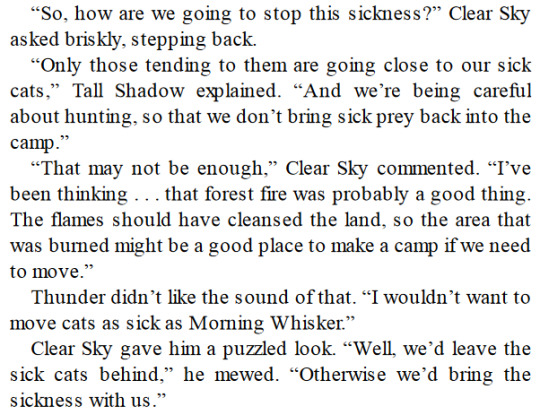
He nonsensically believes that no sick prey is living in the burnt part of his woods and the fire "cleansed it", so all of the healthy cats will abandon the sick to die in their camps and come live on his territory and 'wait it out.'
His plan is that all the cats who become sick will die. It's not quarantine in the sense that they will 'help the sick but keep a distance', he is essentially suggesting a reverse leper colony where everyone who displays symptoms gets kicked out to fend for themselves.
And, in the past, illness was always part of his talking points for throwing cats out of his clan. It was why he tried to throw Frost out, where he would die alone. I went back to Thunder Rising to grab the passage,

This is after he shoves Thunder's face into it and tells him to lick it.
So, it's wholly inappropriate, imo, that Thunder essentially does a little eye roll and a cutesy sigh at this suggestion. "Ohh that's my dad and his ruthless streak." His dad has historically been a monster towards the sick and infirm when they "stop being useful" with this rhetoric. Burdens, disease, weakness. In this moment, he is proposing that they do to an unknown number of cats exactly what he commanded Thunder do to Frost.
Additionally, at this point in time, they don't know how the illness spreads. They're guessing that it's via contact with sick prey, and using leaves as rudimentary tissues/gloves. Clear Sky DOES know, though, these two things;
One Eye knows how it spreads and is not telling.
Many of his cats have been exposed.
He has no idea which cats have been exposed, or how many, or even how long it takes between infection and first symptoms. All they DO know is that symptoms are rapid onset and debilitating. By the time you know a cat is sick, they're covered in sores, have a bloated stomach, and are unable to hunt for themselves. The only thing that is for sure is that turning them out is a death sentence.
And yet he is confused at the idea that Thunder has an objection about leaving Morning Whisker, Wind Runner's kitten who isn't older than a month or two, alone to die.
The solution that the groups eventually come up with is that the clans will remain isolated from each other as to not spread illness, though it doesn't seem to work because infected prey still moves around freely.
Also note that the first time Clear Sky actually gives a damn about an infected person is when Jagged Peak's pregnant wife catches it (After Jagged Peak 'proves' he's useful now by leading a medicine-seeking patrol thanks to Gray Wing). Wind Runner's an "ex-rogue," a group Clear Sky has disdain for, and he doesn't think to have compassion about her baby.
So to answer your question directly, he was 'supposed' to handle it the way the Moor cats did and were, with some basic safety precautions. Not regress to trying to use the illness to get all the cats into a single Clan in his own territory where he could continue to throw "useless/dangerously ill/disabled" out into the wilderness "where the maggots will find them".
#tw medical gore#It's worse than I mentioned but I was trying to be brief about it#Because if I dove into every little thing that is SHOCKINGLY bad about Clear Sky I wouldn't be able to get through the book#I swear im trying to be charitable about the fact his first suggestion was just...#''Kill your sick friends and children and join a brand new camp in MY territory''#''I totally won't assert myself as your leader and make you throw out your friends and family For The Greater Good this time''#''I've been thinking it's a great idea to gather all of the cats in one spot as a contagious illness ravages the forest''#''Don't worry we won't get sick because we'll leave all the weak people behind''#You can think about this for more than 30 seconds and see it fall apart#So isn't it very very convenient that his ''i've been Thinking'' idea involves consolidating power under HIMSELF??? AGAIN?????#At *best* he is so stupid he is inventing a superspreader event#At minimum his plan involves killing a LOT of people via abandonment#And at worst it's actually just another ploy to gain power. But I have to rule that out even though it's the most interesting idea#Because it's Clear Sky Redemption Arc Time and the writers are dead set on not letting him be an interesting character
36 notes
·
View notes
Text
ngl these "which eoran god is/isn't problematic" polls make me wanna rant about Magran but I don't have the braincells rn
edit: i did end up ranting in the tags whoopsie lmao
#hablaty#I love magran as a character and as an... imperfect to say the least goddess#but I will also blow a gasket if my fire godlike watcher won't ever get the option to drive a sword through her heart#bc holy shit do i also hate her#she too is a ''god of staying in your lane'' really she only ever steps in to intervene if some god or another starts shit#thing is tho: her followers aren't like her#a lot of folks of the violent murder hobo variety is drawn to her bc god of fire and war and whatnot#but if you read the codex entries on her she doesn't actually urge people to start wars#the doctrines are actually more along the lines of ''don't start shit take no shit'' or idk#don't go out of your way to start a conflict for no reason but be always ready for war basically#she pushes people to embrace their power and strive for bettering themselves through struggle#problem is that bc like i said she ghosts her followers a lot of her followers will just take these doctrines to justify their atrocities#she doesn't want eothasians gone bc she doesn't care enough about them to want that#she doesn't want animancers gone bc she supports animancy#but she won't stop her followers bc she doesn't interfere with kith unless she has to protect them from the other gods#but also on the flip side if she does step in she will stop at nothing to win#even if that means building god killing weapons and then having her priests off themselves deploying it#even if that means wiping out her own fire giant children in a volcanic eruption (whomst you can save btw pls save the rathunn they're nice#and even if that means eating the souls of her godlike children who#magran is incredible cruel and also very cool and I have very complex feelings on her and just aaaa
12 notes
·
View notes